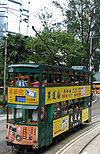Portal:Trains/Did you know/October 2005
Appearance
October 2005
[edit]- ...that the failed Soviet opposed-piston 2-10-4 experiment in 1949 was an attempt to balance the driving forces on the wheels, allowing the counterweights on the wheels to be smaller and reducing "hammer blow" on the track?
- ...that the original Norfolk Southern Railway was a small regional railroad in Virginia and North Carolina for 98 years before it became the namesake of the combination of the large and profitable Class 1 Norfolk and Western and Southern Railway systems in 1982?
- ...that Canadian Northern Railway remained independent only three and a half years in the 1910s after driving the final spike completing its transcontinental route?
- ...that as a result of the first Operation Lifesaver safety awareness campaigns in 1972, the number of grade crossing-related fatalities in Idaho dropped by forty-three percent in 1973?
- ...that Schwebebahn Dresden is the oldest suspension railway (a type of monorail) system in the world?
- ...that Nagoya Railroad, founded in 1894, is one of the oldest private railways in Japan?
- ...that Roslagsbanan, which opened in 1876 in Stockholm, Sweden, is the oldest electrified railway line for public transportation in northern Europe?
- ...that the wrecked steam locomotive from the climactic scene of Buster Keaton's 1927 film The General became a minor tourist attraction for nearly twenty years until it was salvaged for scrap in World War II?
- ...that the Cairngorm Mountain Railway, a funicular mountain railway that ascends the slopes of Cairn Gorm, is the highest railway in the United Kingdom?
- ...that the 4-4-4 steam locomotive wheel arrangement is commonly called the Reading type because the Reading Railroad was the first railroad to use the type, starting in 1915?
- ...that by 1872, it is estimated that the 4-4-0 steam locomotive type made up fully 85% of all locomotives in operation in the United States?
- ...that the Toronto, Hamilton and Buffalo Railway never built tracks into Toronto or Buffalo, New York, but used its parent companies' (Canadian Pacific Railway and New York Central Railroad) trackage to reach the two cities?
- ...that during Alexander Cassatt's tenure as president of the railroad, the Pennsylvania Railroad widened its entire line between Philadelphia and Pittsburgh to four tracks?
- ...that when construction on Berlin Hauptbahnhof train station is completed in 2006, it will be the largest multi-level station in Europe?
- ...that RhB, operating most of the railways in the south-easternmost canton of Graubünden, has the largest network of all the private railways in Switzerland?
- ...that when the Shinkansen opened in 1964, Hikari was the fastest train on the line, travelling from Tokyo Station to Shin-Osaka Station with only two stops (Nagoya and Kyoto)?
- ...that Union Pacific Railroad operated the largest fleet of gas turbine-electric locomotives of any railroad in the world?
- ...that dynamometer cars were maintenance of way cars used to measure tractive effort (pulling force), power, top speed and other aspects of a locomotive's performance?
- ...that the Siemens-Duewag U2 model light rail vehicle was originally designed for and used by German metros, but is now in use in Edmonton and Calgary, Alberta, and in San Diego, California?
- ...that Ansaldobreda, S.P.A., of Italy built the 2000, 3000, and 4000-series rail cars for the Washington Metro, some of the LRVs used by the San Francisco, California Muni and the Boston, Massachusetts MBTA?
- ...that one of the systems proposed to resolve the problem of dual gauge for Africa uses four rails in the track to provide gauges of 4 ft 8½ in, (1435 mm, standard gauge on most of the world's railways), 3 ft 3.375 in, (1000 mm) and 3 ft 6 in (1067 mm)?
- ...that the British War Department's Austerity class of 2-10-0 steam locomotives were the first 2-10-0 locomotives to work in Great Britain?
- ...that the Eurotunnel Group, which manages and operates the Channel Tunnel between the UK and France, operates the car shuttle and earns revenue on other trains (freight by EWS and SNCF and passenger service by Eurostar) passing through the tunnel?
- ...that speeders are also sometimes known as railway motor cars, putt-putts, track maintenance cars, crew cars or inspection cars?
- ...that the company that would become the second largest steam locomotive manufacturer in the 19th century, Rogers Locomotive and Machine Works, began in 1831 as Jefferson Works building textile and agricultural machinery?
- ...that a type of diesel-electric multiple unit nicknamed "Thumpers" (after their characteristic sound) was widely used in south-eastern England as a stop-gap to serve lines that were shortly to be electrified?
- ...that "Bulldog nose" is a nickname given, due to their appearance, to several diesel locomotive classes with GM-EMD engines built from the 1940s to the 1960s?
- ...that The first 4-2-0 steam locomotive (UIC classification 2'A) built was the Experiment (later named Brother Jonathan), built by West Point Foundry based on a design by John B. Jervis, for the Mohawk and Hudson Railroad in 1832?
- ...that Hong Kong Tramways is one of only two tramways in the world which provide regular operation of double-decker trams, and is the only system run exclusively with double-deckers?
- ...that because much of the route of Manchester Metrolink was formerly main line railway, the stations on the former railway routes have normal platforms about 900 mm (35 inches) above ground level; consequently the new stops built in the city centre also have 900 mm high platforms?
- ...that since the great dieselization era of the 1940s and 1950s, many roundhouses have been demolished, but a few still stand and remain in use on the railroads or have been converted for other uses?




















